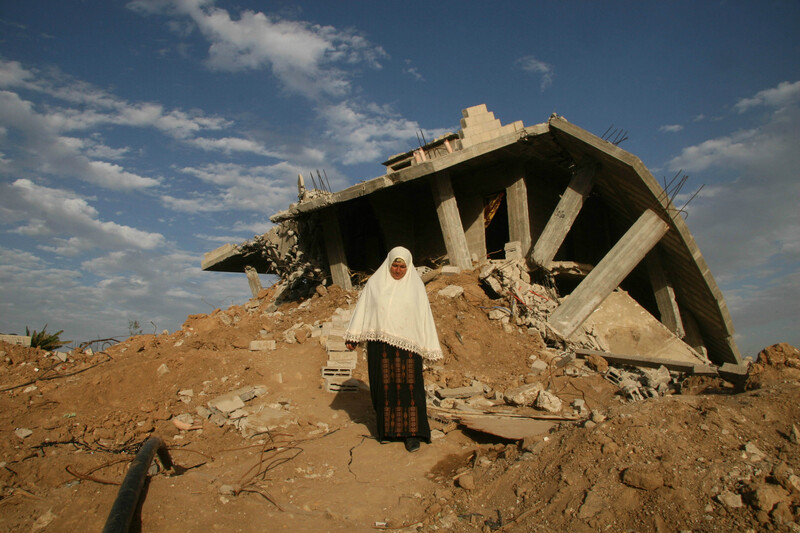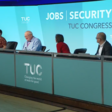The Electronic Intifada United Kingdom 24 September 2012

Following Israel’s attacks on Gaza in 2008-09, British trade unionists have stepped up efforts to engage with Palestinian civil society.
APA imagesA debate and vote at Britain’s Trades Union Congress (TUC) on 11 September marked another watershed moment for solidarity with Palestine.
The motion called for a delegation to Gaza to be organized by the Trades Union Congress in conjunction with the Palestine Solidarity Campaign, in order to “determine how the TUC may most effectively contribute to the end of the blockade.”
Speaker after speaker queued up to speak in favor of the motion on Palestine, which was supported by the TUC General Council, and Congress unanimously voted in support of establishing a fact-finding delegation in order to find out how best to campaign for an end to the siege of Gaza.
Billy Hayes, the general secretary of the Communication Workers Union, moved the motion, which was seconded by Hugh Lanning, the deputy general secretary of the Public and Commercial Services Union. After the vote, the Palestine Solidarity Campaign organized a meeting — separate from the official TUC program — to discuss the next steps for trade union solidarity with Palestine. Hayes said in a speech at the meeting that he was “delighted” to see how little opposition there was to the Palestine Solidarity Campaign proposal.
“This is a big tribute to work that supporters of the Palestinians have carried out in recent years inside the trade unions,” Hayes remarked, adding that once unions have taken careful steps to change policies, they are also reluctant to revert back (“Speech: The Palestine Solidarity fringe meeting, TUC Congress, Brighton,” The Communications Union, 11 September 2012).
Remarkable shift
For a trade union body that represents 6.5 million workers in the UK, the shift in just three years has been remarkable.
The 2009 Trades Union Congress witnessed desperate attempts by pro-Israel forces to block a motion calling for a boycott of goods from Israeli settlements in the occupied West Bank.
But the motion put forward that year reflected the determination felt by many trade union members wanting to take positive action to end Israel’s criminal activity. They had seen the scenes of death and destruction in Gaza that past winter during Operation Cast Lead, and marched on the streets in protest. This put significant pressure to bear on the trade union movement, and meant that the motion was passed overwhelmingly by Congress (“2009 motions: 76 Palestine,” TUC Congress Voices, 2009).
The motion was passed alongside a statement by the TUC General Council. Although policy supporting boycott, divestment and sanctions had been passed inside individual trade unions, this policy committed the trade union movement in Britain as a whole, through the TUC, to call on the government to end arms sales to Israel, ban the import of goods produced in illegal Israeli settlements, support moves to suspend the EU-Israel Association Agreement, and to work with the Palestine Solidarity Campaign (“General Council statement on the Middle East,” 2009 [PDF]).
This helped lay the groundwork for the campaigning work that the Palestine Solidarity Campaign then undertook with the TUC, targeting settlement goods using joint materials, and urging trade unionists locally to lobby their supermarket managers.
In September 2010, policy took a further step forward, and the annual conference this time voted for a boycott of companies which profit from the occupation, settlements and Israel’s wall in the West Bank (“2010 motions: C18 Palestine,” TUC Congress Voices, 2010).
That conference followed another illegal and shocking assault by Israel — its deadly attack on the Freedom Flotilla taking aid to Gaza in May that year. The assault on the Freedom Flotilla took place at the same time as the largest union in Britain, Unite, was having its conference. Delegates to Unite’s conference streamed out onto the streets in an emergency protest against the killing by Israeli commandos of nine passengers, and the wounding of 80, on the Mavi Marmara.
In 2011, this boycott policy was expanded, with an additional point regarding the Trades Union Congress’ calling for unions to review any bilateral links with Israeli organizations, including the Israeli trade union federation Histadrut (“2011 motions: 71 — Peace in the Middle East/South Asia,” TUC Congress Voices, 2011).
Smears
Predictably, those wishing to defend Israel’s crimes have responded by smearing the Palestine Solidarity Campaign and those speaking in the debate at the Trades Union Congress, or claiming that somehow the latest vote doesn’t reflect trade union opinion.
Jeremy Newmark, the Chief Executive Officer of the Jewish Leadership Council (UK), who has led the “Stop the Boycott Campaign” in the UK and was, in 2010, appointed by the Israeli government to the Global Coalition for Israel’s task force against BDS, commented on Twitter that the debate was “characterized by imbalance, abuse, demonization and sickening Holocaust comparisons.”
A more realistic assessment was published in The Jewish Chronicle, whose political editor Martin Bright pointed out that “supporters of Israel are losing the battle of ideas in the UK. This has probably been true for some time, if only they would admit it. But after this year’s Trades Union Congress conference there is no longer any question about it, on the left at least.”
He added: “But the point is that this motion was passed unanimously. The consensus in large swathes of the left is quite simply this: Israel is the oppressor and the Palestinians the oppressed” (“Community needs to rethink how to make Israel’s case,” 13 September 2012).
On this last point, Martin Bright is right. The consensus among anyone who cares to look at the situation honestly is precisely that there is an occupier and an occupied; an oppressor and an oppressed. No amount of hasbara — as Israel calls its propaganda efforts — can negate this reality.
Clutching at non-existent straws will not change the reality of the situation facing those lobbying for Israel inside the British trade union movement. Shortly after the Trades Union Congress debate, fringe meetings were held by both the Palestine Solidarity Campaign and Trade Union Friends of Israel. The well-attended PSC meeting was addressed by a number of leading trade unionists, including the general secretary of Unite — the largest union with almost 1.5 million members — and the president of Unison, the second-largest trade union with almost 1.4 million members.
By contrast, the Trade Union Friends of Israel meeting was confined to a small bar area, where the audience the group had manage to scrape together listened to Alon Roth-Snir, Israel’s deputy ambassador to the UK, who recycled the old arguments that “we need cooperation, not boycotts.”
Simple truth
The truth is very simple. People concerned with social justice and human rights are increasingly taking up the cause of Palestine as a key issue. And even in a context where the economy, job losses and industrial issues are at the forefront of every trade unionist’s mind, the Trades Union Congress sent a clear message that solidarity doesn’t stop at our borders, and that the injustice that Palestinians have been subjected to for decades is an issue that unites us all. Anyone who is against racism and inequality looks at Israel’s policies towards the Palestinians with increasing horror.
We have seen how consumer and trade union pressure has resulted in most supermarkets in Britain saying that they no longer stock settlement goods. We have seen the Cooperative Group’s chain of supermarkets adopting a policy in line with Trades Union Congress policy, and issuing a statement saying that it is no longer sourcing goods from named companies which export from settlements.
The latest Trades Union Congress’ General Council statement to Congress outlined the work that had taken place in the preceding year: “In the UK, nearly all major supermarkets no longer stock settlement goods, yet there are other ways they can enter the country, particularly through wholesale and catering channels,” the statement read, adding that the TUC has argued that it would be lawful for the UK to “unilaterally institute a ban on the import of settlement goods.”
The statement noted that the TUC has raised policy issues with Foreign Minister Alistair Burt, as well as pressing the issue of child Palestinian prisoners held in Israeli jails (“TUC Congress 2012: General Council Report,” 9-12 September 2012 [PDF]).
In just three years, we have seen solidarity with Palestine become mainstream in the trade union movement in Britain. And the impact of a trade union delegation to Gaza cannot be underestimated. Even the prospect of such a delegation has sent the very marginalized pro-Israel trade union lobbyists into a frenzy.
Sending a trade union delegation to Gaza, tasked with developing a strategy for the trade union movement to contribute towards ending the siege on Gaza, will be yet another significant step towards peace, justice, freedom and human rights.
Sarah Colborne is director of the Palestine Solidarity Campaign in Britain.
Tags
- Trades Union Congress
- Palestine Solidarity Campaign
- Billy Hayes
- Gaza siege
- blockade
- Operation Cast Lead
- Gaza
- European Union
- settlements
- BDS
- Israel's wall in the West Bank
- Gaza Freedom Flotilla
- Mavi Marmara
- Histadrut
- Labor Friends of Israel
- The Co-operative Group
- settlement products
- Palestinian political prisoners
- Trade Union Friends of Israel



